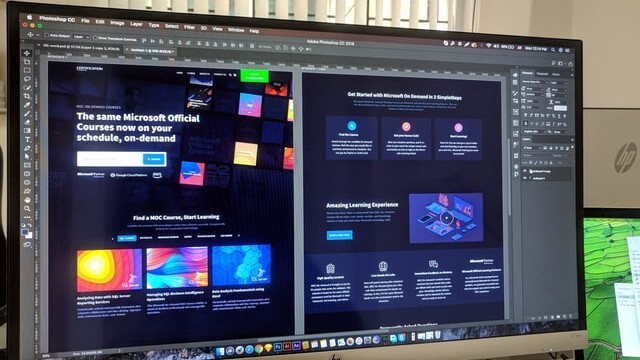Welcome to this exciting comparison article between Web Development and Web Design!
In this write-up, we will analyze the key similarities and differences between Web Development and Web Design plus the future outlook of the two fields.
By the end of this in-depth comparative article, you’ll be able to make intelligent career decisions between these two in-demand web-based professions.
In particular, we will focus on the following areas:
- What is Web Design vs Web Development
- Key Web Designer vs Web Developer Similarities
- Key Web Developer vs Designer Differences
- Outlook of Web Design and Development
Let’s dive right in!
Introduction to Web Development vs Web Design

With the rapid growth of the internet, Web Design and Development are gaining more prominence in everyday life.
Web Design refers to all the processes applied on a website to make it easier to use and improve the user experience.
A Web Designer focuses more on the visual elements of website design, including color palettes, font layouts, visual themes, and other aspects that make a website user-friendly.
On the other hand, Web Development refers to all the technical processes that make a website function correctly.
In essence, Web Developers concentrate on the speed, functionality, and applications of a website.
Please note that Web Development and Web Design are not mutually exclusive and share a lot of commonalities.
Read on to understand the similarities between Web Development and Web Design.
Web Development and Web Design Similarities

Web Developers and Designers constantly need to work together to produce a functional and high-quality product.

Here are some of the key similarities between Web Developers and Designers:
1. Computer-Based
Both the web design and development of website skill sets are Computer-Based, relying heavily on the internet.
Unlike other offline technical professions, Web Developers and Designers heavily rely on computers and the internet to build functional websites.
Web Designer and Developers extensively use Web-Based programs and tools, including:
- Programming languages like Javascript, HTML, and CSS
- Web applications, including graphic design software
2. Create Websites
Though the roles of these two website professionals are markedly different, their end goals are the same; to create functional websites.
To achieve their end goal, Web Designers and Developers use various tools, techniques, and applications.
Besides ensuring that websites are user-friendly and functioning optimally, Web Designers and Developers solve any design or operation challenges further down the line.
Let’s take a closer look at the differences between Web Development and Web Design.
Main Differences Between Web Development and Web Design

Even though Web Developers and Designers share a lot, they still have some fundamental differences in their education, responsibilities, career path, and job titles.
Here are the critical Web Developers vs Web Designer:
1. Job Title
Professionals in the Web Design and Development field go by different titles, including Front-End Developer, UX Designer, and Back-End Developers.
Let’s analyze the job titles in the Web Development and Web Design fields.
Web Designer’s Job Titles
Here are the most common job titles for Web Designers:
- User Experience (UX) Designer
The UX Designer is responsible for ensuring that a website design and interface is user friendly.
Responsibilities of a UX Designer include creating a website’s wireframes/mock-ups, content hierarchy, prototypes, and information architecture.
UX Designers use interactive website tools like Adobe XD, Photoshop, and illustrator.
- User Interface (UI) Designer
UI Designers are responsible for creating and inputting photographic art, typography, illustrations, and graphics, to make a website more visually appealing.
Additionally, the UI Designer creates user interface elements like information elements (message box, progression bars), navigation elements (search fields, tags), and input controls (data fields, buttons).
- Visual Designer
A Visual Designer is responsible for making a website user-friendly and beautiful by using different elements that both a UX and IX Designer use.
Visual Designers work closely with clients to help them comprehensively brand their websites using different graphic design applications and programs.
Please note that Visual Designers are markedly different from Graphic Designers.
Let’s now take a closer look at Web Developers by job title.
Web Developers Job Title
The three key Web Developer job titles include the following:
- Front-End Developer
Front-End Web Developers are responsible for creating the client-side of a website, including the font, color, layout, responsiveness, and performance of the site.
The Front-End Developer is interested in ensuring that the look and feel of a website are user-friendly, aesthetically appealing, responsive, and performs at a high level of efficiency.
Front-End Developers often use different coding languages like HTML, CSS, JQuery, React, and Javascript to achieve their goals.
- Back-End Developer
Back-End Developers are Programmers responsible for the server-side of a website.
The Back-End Developer creates, codes, and maintains a site’s database, ensuring the website performs optimally, including the front and back-end.

Back-End Web Development entails creating libraries, writing APIs, debugging, and performing UI testing.
Back-End Developers depend on different coding languages, including Java, PHP, Ruby, Ruby on rails, C#, and MySQL.
- Full Stack Developer
A Full-stack Developer is a versatile Programmer proficient in both the front and back end of a website.
Full Stack Developers can write code, create and debug a website or web application by themselves and rely on all the tools that Front and Back-End Developers use.
2. Tools
One of the significant differences between Web Developers and Web Designers is the type of tools they use.
Web Designers mostly rely on Web applications and design tools that allow them to create visual elements on a website.
On the other hand, Web Developers mostly rely on their coding skills using different programming languages to create functional websites.
Web Designer Tools
Here are the typical applications and design tools that Web Designers use:
- Adobe Photoshop
- Canva
- Gimp
- Illustrator
- Adobe XD
- Adobe Dreamweaver
- Google Web Designer
- Wireframes
- Figma
Web Developers Programming Languages
Web Developers rely on the following programming languages to create functional websites:
- Javascript
- Java
- HTML
- Mysql
- React
- Angular
- Scala
- Python
3. Duties and Responsibilities
The duties and responsibilities of a Web Designer and Web Developer are markedly different as these two professionals serve various aspects of a website.
Check out the responsibilities of a Web Designer:
- Develop highly user-friendly icons, tags, and color schemes for websites
- Apply the latest website design processes to improve website usability
- Develop suitable design frameworks for a website
- Speed and performance optimization of websites
- Design, create and implement a suitable website layout
- Integrate client’s data feeds and Content Management systems (CMS) into a website
Here are the duties of a Website Developer:
- Create and maintain a website’s database
- Collaborate with Web Designers, Graphic Designers, and other website professionals
- Troubleshoot, maintain, and update websites
- Create and implement website specifications
- Monitor, track, and categorize website traffic
- Design and create highly functional and practical websites
- Create website libraries and repositories
4. Skills and competencies
Web Developers and Designers have some differences in their skills and competencies.
What’s the difference between Web Designer and Web Developer Skills?
Web Design Skills
- Graphic design
- Search Engine Optimization (SEO)
- Digital Marketing
- Content Management Systems (WordPress, Shopify, Hubspot)
- Web design tools
Web Development Skills
- Problem-solving skills
- Coding skills
- HTML, CSS, Javascript, Github
- Testing and debugging
- Web hosting
- Javascript libraries and frameworks
These are the main skill differences between a Web Developer and a Web Designer.
Is it better to be a Web Designer or Web Developer?
Read on as we analyze the strong points of each of these professions.
5. Portfolios
The professional portfolios of Web Designers are markedly different from those of Web Developers since they showcase different skill sets.
A professional Web Developer will typically use Github to showcase their coding experience and past projects.
Professional Web Designers rely on portfolio designs that allow them to display their creative experience by highlighting their expertise in graphic design, web layout, and color schemes.
Web Designers will typically display their professional portfolios through creative websites like Dribble.com and Behance.com.
Why Be a Web Designer?

Being a Web Designer is an exciting and gratifying career path for people who are creative by nature.
Here are a few reasons why it’s worth being a Web Designer:
1. High Job Satisfaction
Like other creative professionals, Web Designers enjoy high job satisfaction levels.
Most Web Designers work in comfortable environments and enjoy high levels of creative freedom, which improves their job satisfaction.

According to a survey by Careerexplorer, Web Designers polled their job satisfaction at 3.3 out of 5 stars meaning that more than half of Web Designers enjoy their job.
The high level of job satisfaction is due to:
- Creative freedom
- Competitive compensation package
- Contribution to their client’s success
- Job flexibility
- Great work-life balance
2. Stable Career Outlook
The future of Web Designing is positive considering the internet explosion of the last couple of years.
According to the Bureau of Labor Statistics, the Digital Designers’ space will grow by 13% between 2020 and 2030.
Further reports by Brainstation.io project the web design industry to grow by 27% by 2024.
The increased demand for Web Designers is due to the growth of online education, e-commerce, online banking, and gaming sectors.
Considering that the population of internet users is likely to balloon in the next couple of years, choosing to be a Web Designer is an intelligent move.
3. Numerous Career Paths
Being a Web Development Design professional offers you various exciting and high-paying career opportunities.
As a Web Designer, you can opt to be a User Experience (UX) Designer, User Interface (UI) Designer, or Visual Designer.
Each of these career options allows you to grow and perfect your skills in web designing.
You can earn additional coding skills and become a Web Developer Designer since the skills and competencies in the two professions are similar.
Web Developer Designers are highly sought after and command higher rates than Web Designers.
4. Freelance
The best part about being a Web Designer is that you can comfortably freelance and be your boss.
Unlike other professions that require you to work for a company and adhere to rules and regulations, Web Designing provides you with the freedom and flexibility of freelancing.
Additionally, the ability to freelance allows you to only concentrate on the projects you like, improving your productivity, quality, and job satisfaction.
5. Competitive Salaries
If you desire a profession that will afford you a comfortable lifestyle, then consider becoming a Web Designer.
Web Designers earn a substantial salary depending on their location, years of experience, and the type of projects they undertake.
On average, Web Designers earn the following salaries:
- Payscale.com – $52,561 per year
- Glassdoor.com – $62,971 per year
- Ziprecruiter.com – $59,439 per year
To boost your earnings as a Web Designer, consider:
- Starting a blog
- Contacting high-paying clients
- Upgrading your coding skills to do Web Designing & Development
- Keep up to date with the latest web design development trends
- Master and perfect web design skills, including design principles
6. Fosters Creativity
Web Designers are more creative than Web Developers, who are good at scripting and working with code.
The web designing industry provides a conducive environment for Web Designers to use their talents in creating visually appealing and user-friendly websites.

If your forte is in creativity, consider joining the web designing sector and turn your talent into an income-generating endeavor.
7. Work in Multiple Industries
In the current era of the internet, many industries require Web Designers’ services.
Web Designers work in different industries, including e-commerce, advertising, tech, fashion, blogging, and publishing.
The typical duties of Web Designers in these industries include:
- Testing the speed and functionality of websites
- Developing interactive landing pages
- Creating website layouts and design templates that meet the client’s needs
Let’s now analyze the main advantages of becoming a Web Developer.
Why Be a Web Developer?

Web Developers are highly skilled professionals who write computer codes that run websites in multiple programming languages.
Here are a few reasons to choose to be a Web Developer:
1. Positive Job Outlook
The future of Web Development is positive, with different reports estimating that the Industry will grow by between 10% to 30% in the next several years.
According to the US Bureau of Labor Statistics (BLS), the website design and development industry will grow by 13% between 2020 and 2030.
If you need job security, consider becoming a Web Developer.
The increased demand for web design and development services means that Web Developers’ jobs are secure.
2. Flexible Educational Requirements
The best thing about the Web Design and Web Development Career is that you don’t need to be highly educated to excel in this career.
The flexible education requirements mean that anyone with the passion and skill to code can become a Web Designer.
Having formal education in computer science, IT, programming, machine learning, and other related fields is great but not mandatory to become a Web Developer.
3. Work Remotely
Working as a Web Developer allows you the opportunity to work remotely.
Since most website design development occurs online, Web Developers don’t need to conform to fixed locations.
Remote work improves your work-life balance and increases your productivity in the long run.
Additionally, remote work helps Web Development companies reduce their overhead costs and increase their productivity.
4. Career Growth Opportunity
The Web Development industry provides excellent, lucrative, high-paying career opportunities.
Web Development and Design career paths include Software Architect, Front-End, Back-End, and Full Stack Web Development.
With additional studies and experience, you can multitask and take up graphic, user experience, and user interface design roles.
5. Active Web Community
A significant advantage of a Web Developer is access to a professional web community.
The Web Developers community is a strong and vibrant community of professionals where you will get the opportunity to grow and perfect your skills.

Additionally, the Web Developers community allows you to learn about the latest Web Development trends and job opportunities.
6. High Salary Range
Web Developers earn above-average salaries and enjoy competitive compensation packages.
On average, Web Developers earn the following salaries:
Indeed.com – $67,686 per year
Payscale.com – $60,832 per year
Glassdoor.com – $70,863 per year
Zippia.com – $80 834 per year
Ziprecruiter.com – $59,058 per year
The Future of Web Design vs Development

The future of Web Design and Development is quite positive, with industry projections putting the growth of the web design and development sector at between10% to 30% in the next ten years.
Web Development Future
The Web Development industry is rapidly growing due to its increased applications in emerging internet technology, including:
- Quantum computing
- API first approach
- Accelerated Mobile Pages
- Progressive Web Apps
- Artificial Intelligence
- Machine Learning
- Blockchain technology
- Cybersecurity
Going forward, Web Designers should expect to tackle more challenging and exciting web projects as the industry becomes more sophisticated.
Future Web Developers will need to learn more about web design to be more effective and command higher rates.
Additionally, the salary projection for the web industry is likely to grow in the coming years.
Web Design Future
The importance of Web Designers is growing as internet users become savvier and demand higher-quality graphics, visual elements, and web layouts.
New and emerging trends, including interactive user interfaces, pageless websites, augmented reality, and virtual reality, are revolutionizing the web design space.
Going forward, Web Designers need to be flexible in changing their skill set to serve the ever-changing web design industry.
The convergence of the different web-creating environments means future Web Designers must invest in learning coding skills to be more effective.
The salary outlook for Web Designers is quite positive and will grow in the coming years.
Conclusion

Web Developers use interactive computer languages like Java, Javascript, and SQL to create computer codes that enable websites to perform optimally.
Web Designers use their creative abilities to create website templates and designs that improve the functionalities and user-friendliness of websites.
If you’ve been struggling between Web Designing vs Web Development, we hope this article has answered most of your concerns.
Please continue reading for in-depth answers to our reader’s frequently asked questions.
FAQs

What is Website Design and Development?
Website Design and Development refers to the processes, actions, and activities to create functional and user-friendly websites.
Web Designers and Developers are the key players in Web Design and Development, ensuring that websites are visually appealing, functional, and have a robust web architecture.
Can a Web Designer also be a Web Developer?
Yes, it’s possible and convenient to be both a Web Designer and Web Developer.
Web Designers and Developers share many similar skills, making switching between the two roles easier.
Being both a Web Designer and Developer improves your creativity and effectiveness, allowing you to command higher rates.
Is Web Design and Web Development the same?
Web Design and Web Development are markedly different regarding skills, training, and core responsibilities.
Web Development refers to the processes that go into creating and maintaining a website’s technical aspects.
Web Design refers to the processes that make a website visually appealing, user-friendly, and satisfy the user’s needs.
Which is better Web Design or Web Development?
It depends on your skills and interests.
If your interests lie in branding, color theory, or graphic design, then Web Design is the perfect career path.
However, if you’re more tech-savvy and thrive on problem-solving, writing code, and developing software, then Web Development is better for you.
Who earns more Web Designer or Web Developer?
The salary range of a Web Designer vs Developer varies widely depending on the experience, skills, location, and organization.
According to different data sources, Web Developers tend to earn more than Web Designers.
According to Glassdoor, Web Developers earn $105,181 while Web Designers make $62,976 p.a.
Which is easy Web Development or Web Designing?
There is no definite answer as to which is easier between Web Design and Web Development since both of these fields require dedication, commitment, and hard work.
Web Designing requires some measure of inborn creativity and talent, whereas Web Development requires a person with great cognitive ability.
What is the difference between Web Design and Development?
The most significant Web Design vs Web Development difference is that:
– Web Designers deal with the design layout, visual elements, and user-friendliness of a website, while Web Developers program codes that enable a website to run smoothly
– Web Design work with apps while Web Developers deal with coding language
What is a Web Developer vs Web Designer?
The Designers of webpages are known as Web Developers, and they use different programming languages to build a website’s core architecture on the server and client-side.
A Web Designer is a creative professional responsible for creating user interfaces and including user-friendly icons, tags, and visual elements in a website.
Front-End Developer vs Web Designer differences?
The Front-End Developer constructs the client-facing side of a website using computer codes, and their duties include creating user interfaces and enhancing user experience.
A Web Designer is responsible for the design layout, color scheme, navigation, and visual elements of a website, including icons, tags, and banners.









